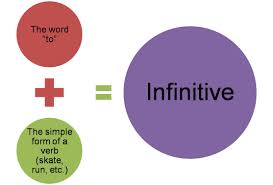
中文词源
infinitive 不定式的
来自infinite,无限的。用于语法结构不定式to.
英语词源
- infinitive (n.)
- "simple, uninflected form of a verb," 1510s (mid-15c. as an adjective), from Late Latin infinitivus "unlimited, indefinite," from Latin infinitus (see infinite). "Indefinite" because not having definite person or number.
权威例句
- 1. The use of the split infinitive is now generally acceptable.
- 分裂不定式的用法现在已被广泛接受.
- 2. Modal verbs generally take the bare infinitive.
- 情态动词通常用不带to的不定式.
- 3. In English an infinitive is often used with the word " to ".
- 英语中,不定式往往与 " to " 字连用.
- 4. The verb " let " , unlike " permit " , is construed with an infinitive omitting the " to ".
- 动词 " let " 与 " permit " 不同, 习惯上与不带"to"的不定词连用.
- 5. Infinitive in the title on behalf of the future actions or events.
- 标题中的不定式代表未来的动作或事件.
